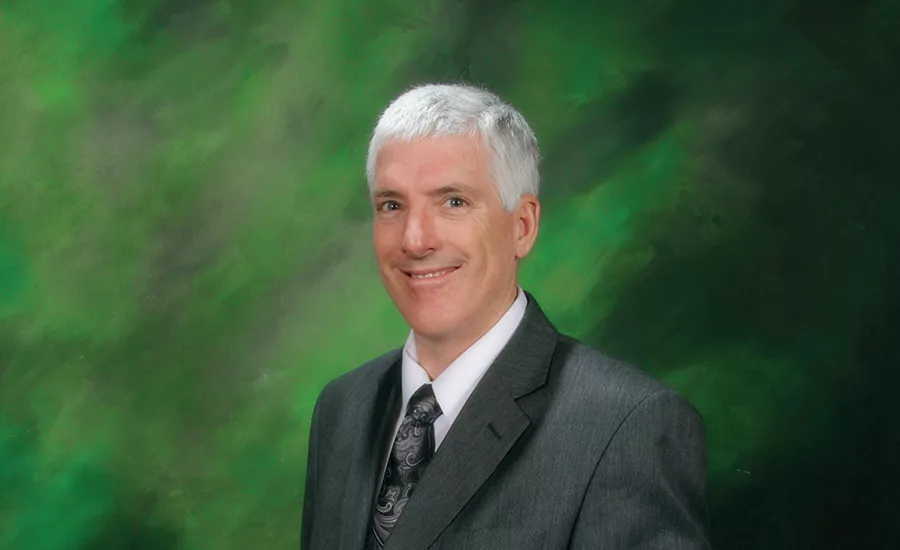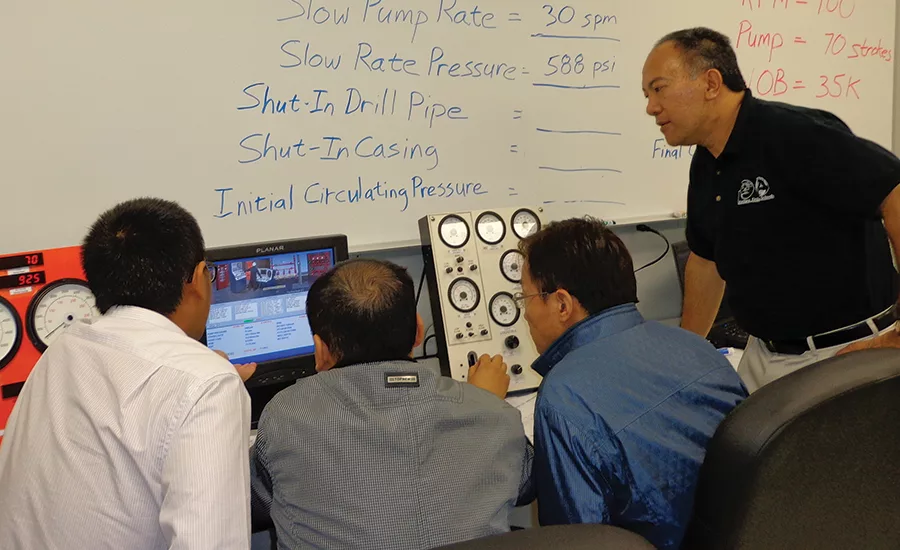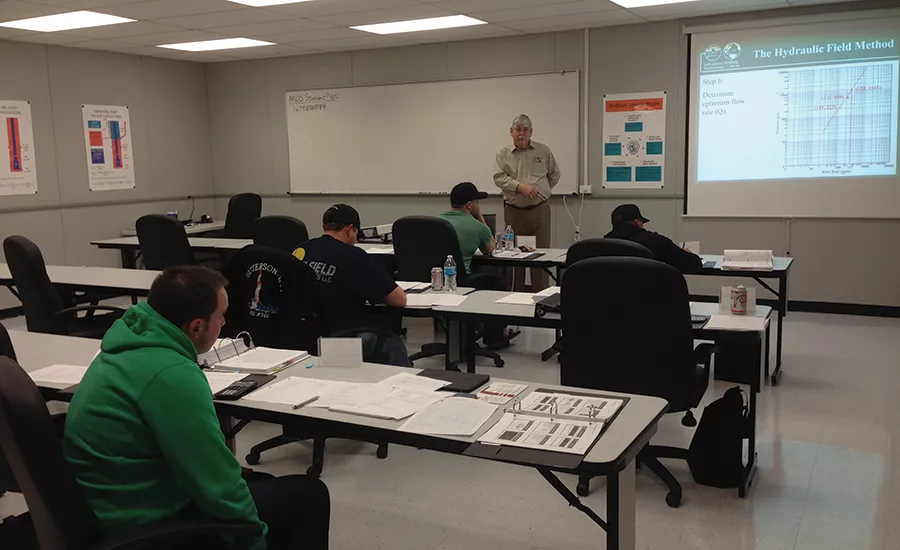You Know the Drill: Dealing With a Downturn

Murchison Drilling School, run by Bill Murchison, focuses on competency and certification in drilling operations and well control. Source: Bill Murchison

Drilling instructors with the Murchison training program are certified with the International Association of Drilling Contractors (IADC). Source: Bill Murchison

The 10-day operational drilling technology course teaches drilling foremen to supervise drilling operations while the five-day practical drilling technology course helps equip drilling personnel with the technical tools needed to become effective supervisors. Source: Bill Murchison
Bill Murchison is president and CEO of Murchison Drilling Schools Inc., headquartered in Albuquerque, N.M., with an additional training center in Houston and a satellite branch in Ghana. The business offers training mainly to operators, contractors and service companies tied to oil and gas, but also clients who work with geothermal.
Murchison took over the company when his father, the founder, asked him to in 2005. The drilling school was launched in 1977, after his father was asked by a number of drilling companies to establish a drilling training business in the States. He had started a training program in Iran for the Iranian Oil Consortium, and it was well received.
Although Murchison spent around 15 years of his youth in Iran, where his father was stationed, it was never his intention to follow in his father’s footsteps. His sights were set on golf and he ended up playing for Texas Christian University on a full athletic scholarship. After obtaining his business degree, he played professionally for 20 years. His resume includes notable tournaments such as the PGA Tour and the Nike Tour.
Since retiring his clubs, Murchison has worked to keep the drilling school healthy.
“But we’re in a pretty serious, significant downturn right now and training budgets have been severely slashed, so there’s not a whole lot of any training going on,” Murchison says.
The training program focuses mainly on drilling operations and well control, teaching newcomers to the profession all the way up to supervisors. He says around 60 percent of course takers are engineers. The program offers scheduled courses at its Albuquerque and Houston locations, and onsite training when requested by clients.
Over the course of the downturn, Murchison estimates that rigs were cut by around 80 percent.
“That’s 80 percent less people to train,” he says. “The budgets are down, so the few people that were left, the company said they’d cut the training budgets and aren’t going to do any more training than what’s absolutely mandatory — not what’s recommended, but what’s absolutely required. We’ve never seen it quite this bad as far as the severe budget cuts we’ve seen this time. It’s pretty significant.”
For that reason, Murchison is doing what he has to to survive the storm and prepare for brighter days, which means making tough decisions and taking on more work for less pay.
Q. What do you do and what keeps you coming back every day?
A. That’s a good question. I think that we have a very good product. I think that we have a very needed product in our industry. So I think we have a lot to offer the industry. So the real motivation I have is to continue providing excellent training to our industry. Another thing that motivates me is we want to continue to grow. The industry continues to change and grow, and we want to continue to grow and offer the things that are needed in 2016, not just things that were needed in 1977 when we started the company. So we want to continue to update our materials, we want to continue to improve the way we do things. This morning I was reviewing some slides that one of our engineers has put together that he thought would help communicate a certain principle more effectively. Those are things that we like to do.
Q. What does a typical workday involve?
A. In this downturn, I’ve had to do some different things that we wouldn’t think I would have to be doing. I have a marketing degree and I like to do marketing. Our marketing director does an excellent job, and this morning I spent some time working on a contract that she was writing with a group in the Philippines that wants to use Murchison. I spent a good 25 minutes reviewing a contract, making changes. I like to help with the marketing, but we’re not going to many conferences right now because we’ve had to slash our budgets. Normally I would be going to maybe six or seven of these conferences during the year, but that’s not the case right now.
Normally, our business is such that we would have teachers teaching all of the classes. I’m having to teach more classes now than I have in a long time. We’ve had to cut back and we’ve had to lay off some of our people, so I’m teaching some of these classes myself. I’m going to Midland one week out of the month. So 25 percent of my time is spent in Midland, Texas, teaching well control classes. I’ll be going the first week of October to our Houston training center to teach one of our classes in Houston. One of the hats I’m wearing is as an instructor right now. I’m a good instructor, but I don’t really have the operational experience that we really like for our instructors to have. Our preference as a company is to put very qualified engineers who have a lot of experience in front of the classroom, so I’m kind of a second resort.
Of course, I also have responsibility for all areas. Right now I’ve been working hard on the facilities in Houston and [Albuquerque]. Our lease is coming due in Houston, so I’m trying to work on what we can do to maybe lower our expenses there in Houston. Do we take a smaller-sized building? Those things take up some of my time. My time is pretty diversified between a lot of different areas right now: between marketing, operations, administration, training itself, finances. There are a lot of different hats I’m wearing right now. I’m not just focused on one area.
Q. What does it take to succeed at what you do?
A. I think one of the things that you have to do is you have to be able to wear a lot of hats. You have to be able to survive the downturns. Our business has been cyclical; it’s been that way for many, many years. This isn’t the first down cycle, so you have to be able to survive the down cycles. I’m getting paid essentially a secretary’s salary during this downturn. When we had to start making cuts, I took the very first cut even at the end of 2014, before the downturn was really apparent to everybody else. I could see that it was coming and I took a pay cut.
Then in the spring of 2015 we saw that it was worse, so I took a second pay cut. I’ve had five pay cuts; I’ve essentially lost 80 percent of my income. But I’m doing what we have to do to survive the downturn. I think if a company doesn’t have a large parent company with lots of resources, if you’re a smaller company, you’re going to have to bring your expenses in line with your earnings if you’re going to stay in business. On the flip side of that, I’ve spent money this year trying to look at the future. I’ve been developing a new engineer to be an instructor, so I’m doing what I can to get him certified and get him experience even though I’m losing money on every class that he teaches because I’m having to have either myself or another engineer sit in the class with him. So I’m paying double, but I’m trying to build for the future for when this thing returns. You have to have an eye on the future, but you also have to have a good handle on what’s going on right now so you can survive.
Q. What do you wish you knew when you started?
A. Hindsight is pretty good. A lot of people have said this is the most severe downturn we’ve ever experienced. So having said that, it’s easy to look back and say I should have let some people go a lot sooner, I shouldn’t have expanded, I should have kept things a little smaller even though it would have been cramped. But I don’t know that you can know that for the future because different downturns I’ve been in haven’t been this prolonged and this severe. The more people you can keep, the better off you are for the future. So that’s a difficult question. You want to preserve as much of the company as possible, but in order to survive, I think I probably should have kept a little more capital by taking some more severe actions sooner. But nobody knew how severe this was going to be.
Q. What tool can you not imagine working without?
A. A computer. For me, you communicate by email, you communicate with the world through the Internet, I read trade journals. Everything I read is pretty much online. Everything that we teach, all the materials we prepare, we’re preparing those electronically; you have videos, you have PowerPoint that you need your computer for. Everything that we do is computer.
Q. What’s the best piece of advice you’ve been given?
A. I’ve been asked to be a conference speaker at a conference in Fort Worth. I’m going to be talking about having the attitude of doing things right without being forced to do them right. I’m going to be talking about some wisdom that King Solomon gave thousands of years ago. He said to go observe the ants because without a chief officer or ruler they go ahead and get their work done without anyone telling them to. I think that’s an important message for our industry. We don’t need the regulators to force us to do things. We should be self-regulating.
My father, for a long time, would not allow our company to teach a well control class because he said you can’t teach well control without teaching drilling operations. He wasn’t going to do it if he couldn’t do what was right. After the Macondo incident, all of these regulators came out with all of these new regulations on what had to be in the curriculum. What we found is we didn’t have to add anything to our material because we were already covering all of those things. They increased the length of days for a class. We didn’t have to increase ours because we already had a longer class. It brought the industry more to where we’re at only because we were doing the things that we knew were right to do without anyone forcing us to do it. I think that’s an important lesson for us as an industry.
Q. How would you describe the present state of the industry?
A. If you want one word, it’s “hurting.” It’s in bad shape, particularly here in the United States. If you’re one of the hundreds of thousands of people who’ve lost their jobs and you’ve got a mortgage to pay and car payments and children to feed and you don’t know when they’re going to start drilling again, this is pretty devastating. So the industry has been in trouble. … There is a positive side. The industry doesn’t stay in the down cycle forever. We’re seeing some glimpses of things. I don’t know that it’s going to be a quick rebound, but I certainly think we’re coming out of the down cycle and we’re at the beginning stages of a recovery. That’s the good side of it. As we rebound, there’s going to be a need for training again and training budgets will be increased. There’s a positive ending to the story.
Looking for a reprint of this article?
From high-res PDFs to custom plaques, order your copy today!




